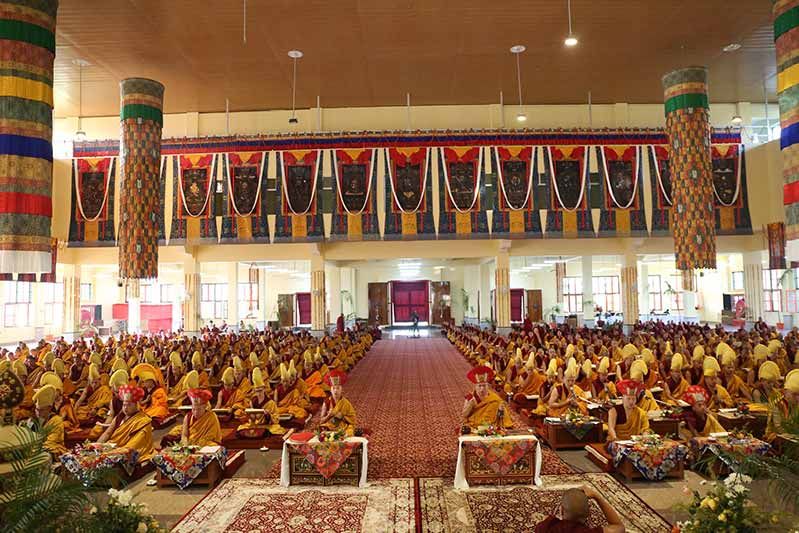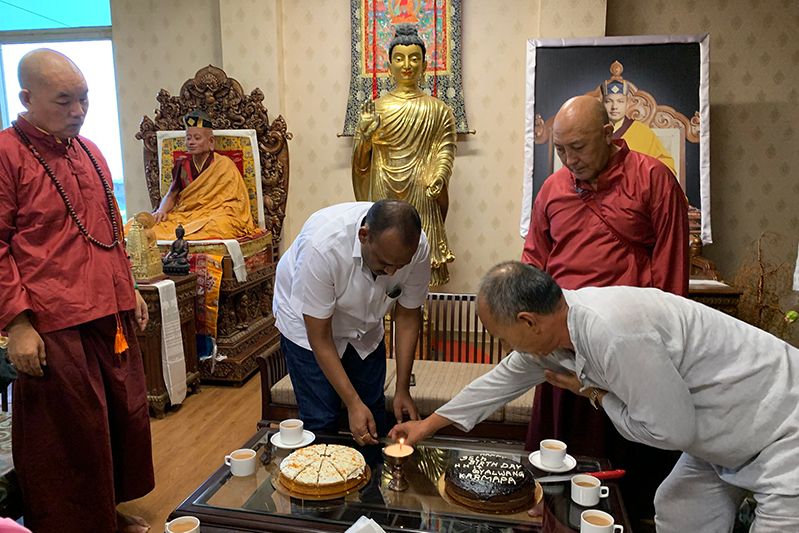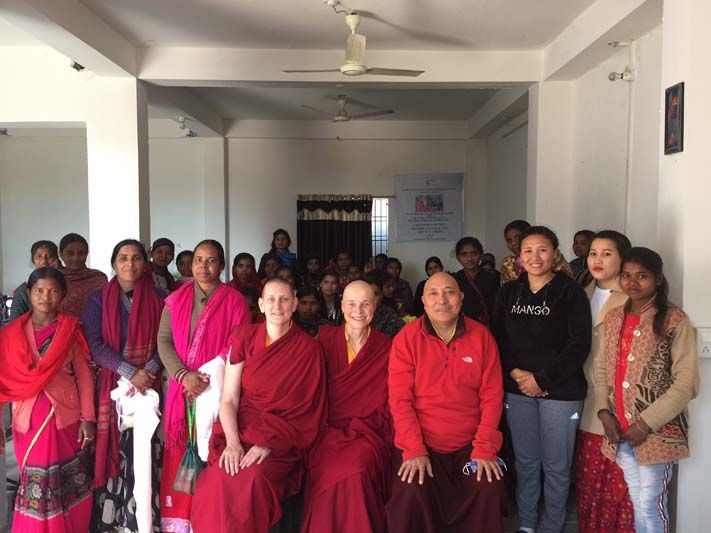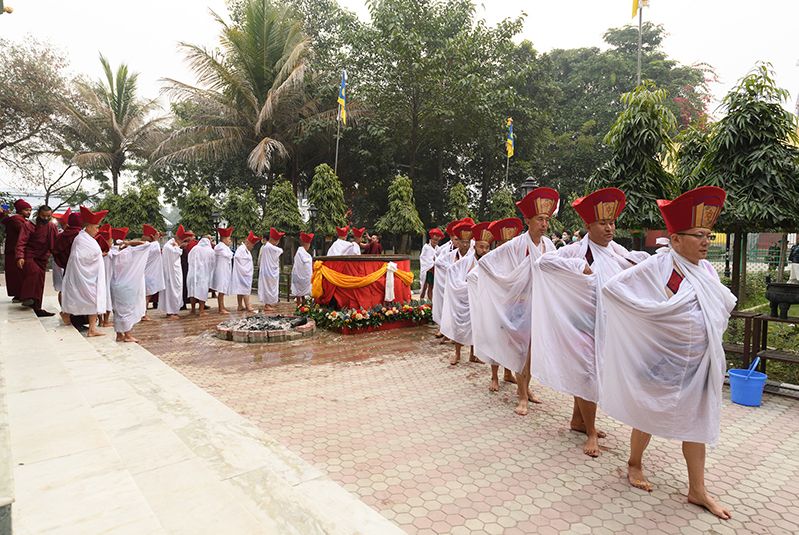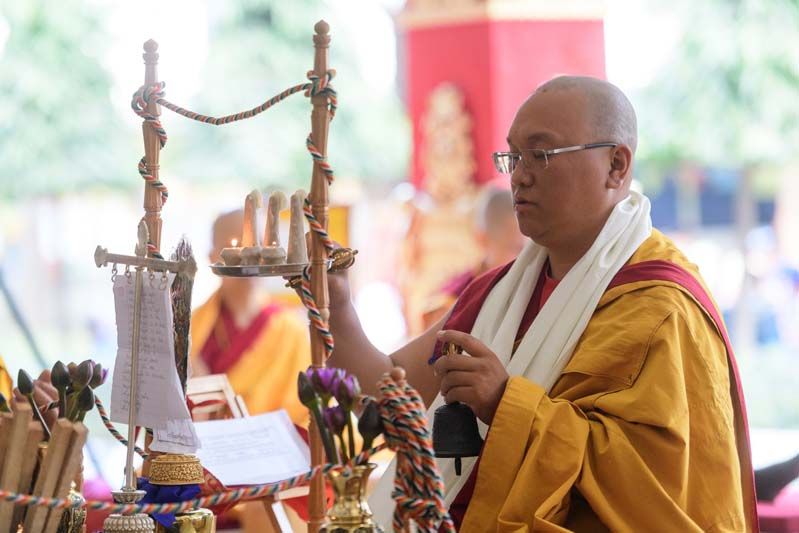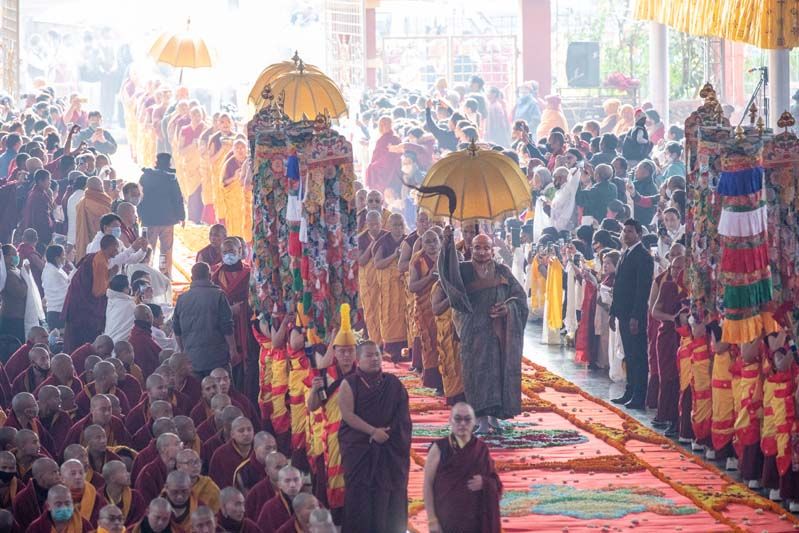More Words on the Environment
- December 27, 2007
December 27, 2007, 4:30 PM, Translated by Ringu Tulku Rinpoche & Karma Choephel
We concluded everything the other day so that it would not be necessary to say any more today. But some people wanted me to say a bit more on a few topics. In addition to concluding the Monlam, today we have completed the practice and mantra recitation of the Medicine Buddha, so it seems there would be nothing wrong with saying a few words at this point. I am often a bit glib, so if you think it is meaningful, please keep these points in mind. If you do not, you do not have to listen.
The other day, the last day of the Monlam, I spoke on three topics. The second topic was the environment. I thought I would say a bit more now about the environment.
Most of us gathered here today, whether we were born in Tibet or not, have connections to Tibetan Dharma and culture and to the Tibetan language. That is the kind of people we are. Likewise, most of us gathered here live in and come from India, Nepal, Bhutan, and Sikkim. These countries are very close to Tibet. For this reason, all of us who live in these countries need to give some thought to protecting the environment of Tibet in order to protect our own environment. This is because most of the water, especially drinking water, in about eight Asian countries, including India, comes from Tibet. Thus, if Tibet’s environment is no longer as clean and pristine as it used to be, this presents the danger of great harm to many Asian countries.
In particular, if the water system in Tibet does not function properly, it will cause many problems such as floods downstream, like the floods along the Yangtse River. When these great rivers burst their banks, it causes tremendous damage. There are floods and many other dangers. For these reasons the Chinese government plans to plant many forests in Tibet. India and other Asian countries are also taking a great interest in the environment of Tibet because it is such a crucial issue.
Whenever we open our mouths, we say that Tibet belongs to the Tibetans, but what are we Tibetans doing for Tibet? Are we protecting Tibet’s environment and keeping it clean, or are we destroying it instead?
Traditionally, Tibetans have held some ancient beliefs. If there was an impressive mountain, we would say it was the residence of some spirit, so it was a revered place that no one should disturb, nor should it be mined or quarried. If there was an impressive forest, or a boulder or cliff with an unusual shape, that was also some spirit’s residence. This belief was quite helpful.
For example, when I was young, we did not dare go out to play on the revered mountains where the local deities lived. Forget about disturbing them—we did not even dare to walk there. We also were not allowed to put our hands in the streams that provided drinking water. This was to keep from polluting them and angering the nagas. If we had to wash our hands or feet, we had to draw some water from the stream and wash elsewhere. We were not allowed to wash, bathe, do laundry, or use any chemicals in the stream itself under any circumstances. There were similar traditions more or less everywhere.
But nowadays everyone considers these traditions to be blind faith. Many people, especially the young, say, “That’s just blind faith. That’s just religious belief.” The protection of the environment these traditional views provided is decreasing drastically. The traditional way of seeing things is gone, but contemporary education and views about protecting the environment are not particularly widespread. The main focus is economic development and getting rich. That is what people are into. They wonder whether it is better to run a factory farm, build huge houses, or buy cars. That is the thinking that is prevalent.
How are houses built in Tibet? They are built out of stone and wood rather than concrete. So nowadays, they use an awful lot of wood to build beautiful, Tibetan-style houses—a lot more wood than they used to. In the old days, only the monasteries would have such carving and decorations; but nowadays many ordinary people’s houses have fancy carved window and door frames and so on. At first glance, it is very lovely, but it wastes a lot of wood and stone. Entire large mountains are flattened. If all the mountains and forests are used up, there is greater danger from earthquakes and floods. There is nothing to hold back or channel floodwaters; there is nothing to contain earthquakes. Destroying everything creates a lot of problems.
There is a lot of factory farming for meat. This did not used to exist in Tibet; it was not necessary. But nowadays factory farming is easy work. There are factory farms for hogs, chickens, ducks, and cattle. They give injections to the thinner sheep or cattle to make them fatter. This is fine, but indirectly through this, they have used a lot of steroids. Factory farms are getting bigger, and the livestock increases. All that livestock produces a lot of manure and methane, which fouls the environment. Air that used to be clean and pristine is now becoming smoggy. We Tibetans have to really think about all this.
Tibet is on the roof of the world, and it is clean and pure. It is our own beautiful country. Even if others cannot protect it, we must keep from ruining it ourselves. If we take good care of it, we Tibetan people will not have wasted our honor and responsibility. We have already lost so much of what we had, and if we destroy more of what have in our hands, there will be nothing left that you can call Tibetan. Even if there were an agreement between Tibet and China, and we could gain freedom for Tibet, what kind of a homeland would we return to? We will have ruined our homeland. If we turn it into a huge, ugly wasteland, gaining freedom will not help us gain happiness.
One reason all this happens—and it is our own fault—is that we do not have much interest in education. The more interest we take in learning about the environment, the more we will cherish and care for the environment. For that reason, the Dharma king Songtsen Gampo said:
In the high, pure mountain land encircled by glaciers,
The pure sounds of Sanskrit could be spoken.
You, the people of the Land of Snow
Who have this precious human birth:
I urge you to devote yourselves to learning.
This says that you must become educated. You have a perfect language, like Sanskrit.
Getting such a good education is like gaining an excellent language, like Sanskrit. Tibet has an excellent environment, encircled by snow mountains so that it is protected from pollution from outside. These protect both the borders and the environment of this land perfectly. So this verse says that all those who have a precious human body there should become educated. Getting an education is very important. It is all of our responsibility that everyone become educated and protect the pure and clean natural environment of Tibet.
As I said earlier, all of us gathered here, whether or not we were born in Tibet, have connections with Tibetan culture and language. Thus we all must protect the environment of the entire world for its future, and in particular Tibet and the Himalayan range. Tibet is probably the most important source of drinking water in the entire world. We really need to consider this.
As I said the other day, we must consider this within each of our monasteries. I think it would be very good for any monastery in India, Nepal, or Tibet to get organized and take an interest in environmental protection. I am not an expert on environmental issues, but there are a few points we should know and follow. I will explain them to you. Please keep them in mind. If you can practice these in your monasteries and provide some education in them to the monastics and householders associated with your monasteries, this will bring benefit to all of us as communities and individuals.
There are several points. The first is sort of like child’s play. It concerns automobiles—trucks and cars. I do not know a lot about this in India, but in Tibet, it often happens that as soon as a lama completes a three-year retreat, he absolutely must buy a truck. If he does not buy a truck and carry around Karma Chakme’s book on Toh rituals, he is not considered a real lama. We had a little monk at Tsurphu who had only been a monk for three or four years, and someone once asked him, “What do you want to do?”
He replied, “I want to become a lama.”
“What will you do when you are a lama?”
“I'm going do a three-year retreat, buy a truck and Chakme's Toh book, and then travel.”
He saw lamas doing this. This is what little children think lamas should do. Every lama buys his own car, and then they have to buy oil and gas for that car. Oil comes from underground, but the oil in the world is being used up, and this creates problems. These days the price of oil is increasing, and this is causing a lot of problems, right? This is why we do not need a separate car for every lama. But now everyone needs the fanciest cars with the most impressive names—German ones like BMWs or, in Tibet especially, Japanese cars like Toyotas—which use the most gasoline. Otherwise they do not feel like they have the status of a lama.
From one perspective, I have to wonder whether this meshes with the lives of earlier masters, who are good examples of having few desires and being satisfied with what one has. Lamas are Dharma practitioners, whether or not they are monastics, which means they should be people with few desires who are content with what they have. They should not chase after the eight worldly dharmas of this life directly, although things might come to them naturally. That is how they should be. These days it is not like that, and that is a problem.
Sometimes when lamas and monks go abroad, their sponsors offer them gifts. Sometimes sponsors buy them mobile phones, and when they do, it has to be the best one. Monks have even been known to throw away cheap phones they do not want. I have heard about this happening. If you pay for it yourself and throw it away, that is one thing. But if someone spends money to offer you something, how could it be OK to throw it away? You have to realize this. If you do not need it, give it to a friend who does.
We need to rethink whether we should buy so many cars, especially big cars that use a lot of gas. I do not know whether this happens in India as well, but if it does, we should practice restraint, because this is not good, especially from the local people’s point of view. Most of us here in India are refugees. If the refugees are all driving the fanciest cars, the local people will hardly think of us as refugees; instead they’ll be jealous that we drive fancier cars than they do. It does not look good. It is unnecessary. So the first point is that we need to think about cars.
The second point is that in the remote areas of Tibet, they are using a lot of solar and wind-powered electricity. This is good. It is very expensive to generate electricity, and if we use it without caring for the environment, it is very destructive to the environment. Oil-powered generation is especially expensive.
At Tsurphu monastery, there did not used to be any electricity, but then they installed solar panels. Solar panels are still quite expensive, which makes them a bit difficult to install. It can be very expensive to provide the amount of power that can cover a large area. But solar and wind power do not have operating costs, and they do not harm the environment. They can be quite beneficial.
In Tibet, the sun shines quite well—it is the roof of the world—so many people there use solar electricity. In some areas of North India and Nepal, particularly around Darjeeling and Mirik, it is always foggy, so you never see the sun shining, which makes for a few small difficulties. However, in our monasteries, we are big groups of people, and we have large electricity expenses. Since we are already paying for it, we should think about how to conserve electricity. Do not just pointlessly leave lights on all the time when the sun is shining and the weather is bright. I think it would be good for us to conserve electricity. That is the second point to keep in mind.
The third point is growing trees, which I mentioned the other day. We bhikshus are not allowed to cut down trees or any other plant that has roots and bears fruit. This is the vast intent of the Lord Buddha. But not only bhikshus; all of us must keep this in mind. Most of the oxygen for all the living creatures in this world comes from trees and plants. So if we can plant even one tree, it will probably help a great number of creatures survive. Sometimes I even think it would be better to plant a single tree than to perform a life-release for many beings.
Last year I talked about performing life-releases, giving up eating meat, and becoming vegetarian for the long lives of His Holiness the Dalai Lama, myself, and many of our lineage lamas who have become elderly, so that they might continue to be with us for a long time. This year I think it would be good for each of our monasteries to plant a thousand trees, if not more. When I say plant, this does not mean that it absolutely has to be done right near the monastery. You can make connections with groups that plant forests or help someone who is planting trees. This is for monasteries that have the resources to do this. If you don’t have the resources, that is another matter. There are, however, monasteries that have some wealth and want to do something for their lama’s long life. My particular recommendation for this year is that it would be good for each monastery to plant at least one or two thousand trees. If monasteries cannot, the monks can plant the trees themselves. Sponsors would also be most welcome. Most monks don’t say they have much money, and I don’t know where they spend what money they do have. It would probably be quite good if we could make a beautiful green forest for the benefit of all living creatures, especially in Tibet.
Tibet covers a huge area, so we could plant as many trees as we want. If monasteries have to cut trees, then it would be good for them to plant a greater number than they cut. Cutting trees without replanting is the one thing that would anger the local deities and nagas, if anything would. That is another point.
The fourth point is one that is not our responsibility as monks. Monks do not farm, right? But when farmers grow crops, they use various kinds of chemical fertilizers to make the crops grow quickly. When they do this, the first crop grows extremely well, but after it has grown, the soil loses fertility and becomes like sand, I have heard. The chemical fertilizers exhaust the soil. This is how it happens.
There are many farms in Tibet. When we plant our crops, we should not think that this is our own field and we can do whatever we like. That is one thing to think about. The other is that the use of chemical fertilizers is exhausting the fertility of large areas of cropland. Monks do not need to work in the fields themselves, but they have many friends and relatives who do. Unless we use our overall, collective effort, it will be difficult to protect the environment.
There are several other points, but we do not need to go through them.
In brief, for the human race, there are two conditions in this world that can make us advance. The first condition is to go forward out of fear. All beings, including animals, will advance out of fear. They sense a danger to their existence, feel fear and terror, and find a way to remedy their situation. But I think moving forward because you see a benefit or profit is probably something that mainly we humans do. We humans are beings with brains and intelligence. But while we have these brains and intelligence, if we just hang out without doing anything meaningful, then there will be another mouth to feed, another person using up space, another body crowding the world. There will be no benefit at all.
While living in the world, we need to demonstrate intelligence and define our vision for the future. I think that only then will our existence in the world be meaningful. We will no longer just be taking up space. We will be able to benefit the other creatures who live with us on this earth.
That is more or less it for the topic of the environment. If I say too much, the mosquitoes will have a feast. We have to protect environment . . . but we should think about whether we need to protect the mosquitoes.
Protecting the earth’s environment is a big issue in the world now. But that is not why I am shivering on this throne talking about it.
The Lord Buddha and many of the earlier learned and realized masters who followed him made prophecies a long time ago about how the times would become degenerate: the environment would degenerate, and beings living in it would also degenerate. These are things the earlier masters said, but we do not pay attention to them. People just talk about how it said this here and that there.
I want to tell you a story. During the upheavals in Tibet in the 1950s, the previous incarnation of Pawo Rinpoche was looking through the prophecies of Guru Rinpoche, and thought, “This probably is going to happen.” He showed them to his steward and said, “This is going to happen. These are the prophecies of Guru Rinpoche. We need to flee into exile; we cannot stay here.” Whenever he showed these to his steward, the steward would say, “So it is! I go for refuge!” The steward would then touch them to his forehead and put them aside.
Later the situation got worse, and even the Karmapa went to India. When Pawo Rinpoche heard about that, he said, “The prophecies predicted this! Even the Karmapa has gone. We had better go, or what will happen to us?” The steward replied, “How can that be? There are the three great monasteries of Sera, Drepung, and Ganden, and the Tibetan government palace of the Potala. It is not easy to leave. If you prepare to go, you will ruin any chance of staying.” He absolutely refused to do anything about leaving. Either he was not educated or he was complacent because he had never faced such difficult circumstances. In the end, the steward was unable to come to India and suffered terribly. He was sent to reeducation camps where he was tortured, beaten, and eventually died.
It is similar with us. The Lord Buddha and earlier masters said a great deal about how we need to protect the environment, the forests, and the trees. But when we hear this, we just touch the text to our foreheads and say, “I go for refuge!” The eloquent and beautiful words, “May it be so! May there be benefit for all! May it happen! May this be for all sentient beings throughout space! May that be!” often pass our lips, but we do not practice them in a meaningful way. We are still wandering in the oceans of samsaric suffering because our wishes and our actions are going in opposite directions. If we continue in this way, we will remain in samsara forever. There’s no other benefit. So please keep this in mind.
That is it. Say the auspicious prayers. It's getting late.
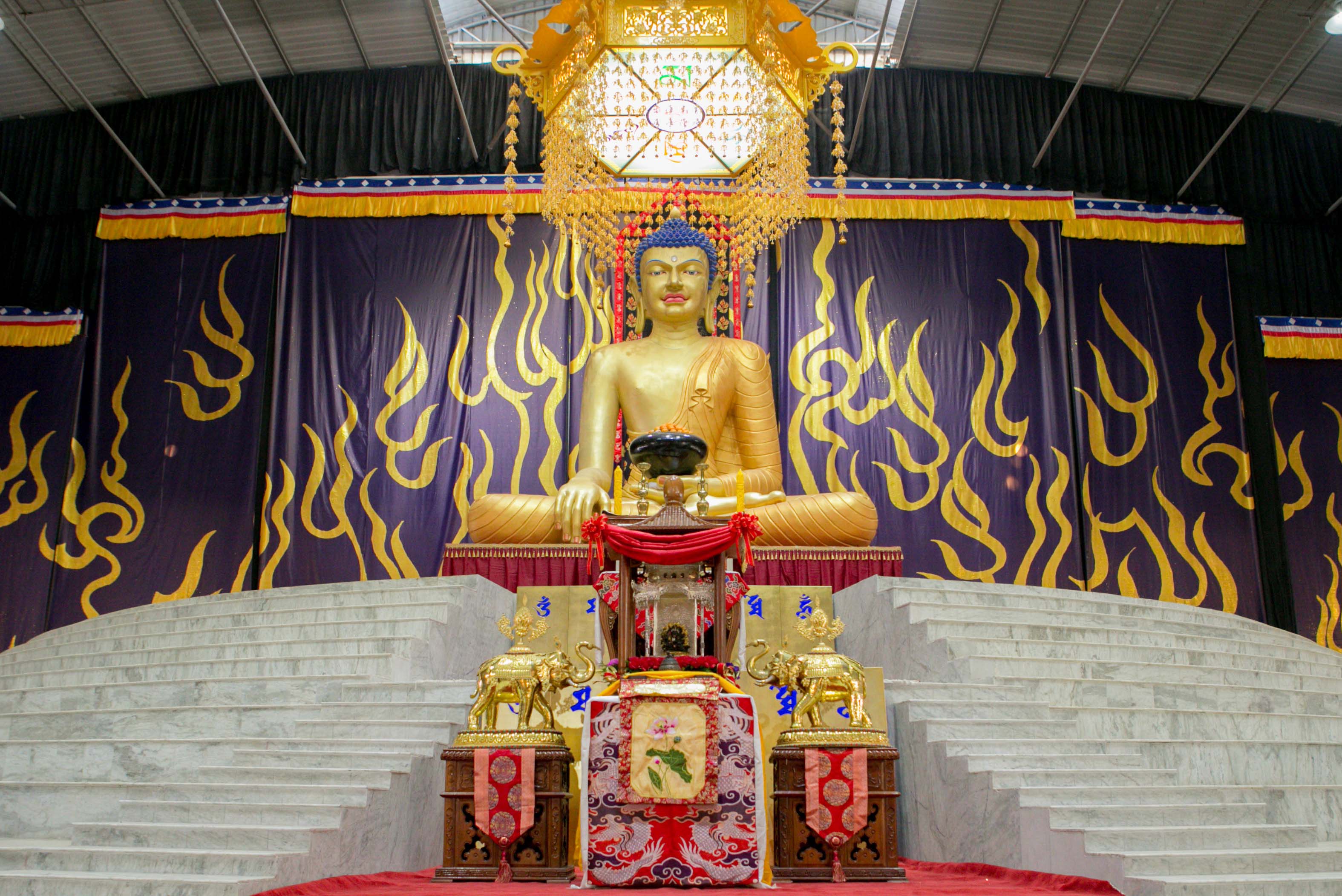
37th Kagyu Monlam Schedule
Tibetan / English / Chinese • French • German • Indonesian • Korean • Polish • Russian • Spanish • Vietnamese
Dharma Teachings
 Meditation Instructions
Meditation Instructions
Recorded during the 37th Kagyu Monlam, Bodhgaya, India. January 28-30, 2020.
